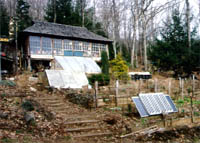|
By Kevin Kanarek
|
|
 s with many rural areas that offer a low cost of living and abundant natural beauty, western North Carolina includes several cultures. There are the locals (people whose families have been in the area for generations) and those who've arrived in the past 20 years or so. There are rich and poor, artisans, artists, librarians, teachers, small businesspeople,
and everyone in between. These are not exclusive categories so much as overlapping circles, much as in a topographical map. s with many rural areas that offer a low cost of living and abundant natural beauty, western North Carolina includes several cultures. There are the locals (people whose families have been in the area for generations) and those who've arrived in the past 20 years or so. There are rich and poor, artisans, artists, librarians, teachers, small businesspeople,
and everyone in between. These are not exclusive categories so much as overlapping circles, much as in a topographical map.
Now, rural regions throughout the country are feeling the impact of the information age. The existence of computer networks adds new cultures to the mix as knowledge workers and other telecommuters are able to live in scenic rural areas and bring their work with them. But while bringing the infobahn to western North Carolina is no doubt a positive step for the economic development of the region, it is not only so in terms of attracting new companies and professionals.
 Most of the people that I met involved in building and using the community-based Mountain Area Information Network (MAIN) were either from the area or had been living there for several years. The wiring of western North Carolina doesn't so much enable them to take digital jobs into the back country, but rather supplements their existing business and information needs, giving them additional skills and opportunities right where they are. Or it lets them stay in touch with children and grandchildren who have moved away for school or work. Or it enables them to get financial aid information specific to rural secondary school students, to reserve books, or to read newspapers and magazine articles online.
Most of the people that I met involved in building and using the community-based Mountain Area Information Network (MAIN) were either from the area or had been living there for several years. The wiring of western North Carolina doesn't so much enable them to take digital jobs into the back country, but rather supplements their existing business and information needs, giving them additional skills and opportunities right where they are. Or it lets them stay in touch with children and grandchildren who have moved away for school or work. Or it enables them to get financial aid information specific to rural secondary school students, to reserve books, or to read newspapers and magazine articles online.
My brother Michael became interested in digital media about the time he and his family got a computer and moved down out of the mountains of western North Carolina to nearby Asheville (population 60,000). There was no particular relation between those two events: The main reason behind the move was Michael's job as a city firefighter. Michael had gotten an AOL account and found some rescue-worker Web sites and equipment lists. But he was ready to venture from the AOL Mall to a community-based ISP or bulletin board that could give him full access. Once we got in through MAIN, we found that my brother was already on the Web, so to speak, as a result of his former vocation: Alta Vista found his name on a membership list of the American Blacksmith's Association.
Maybe one day my brother will use MAIN to build rescue service Web pages for the fire department where he works, or put catalogs of his ironwork online. He already has plans to work with MAIN to get public safety organizations online. His immediate ambition is to find a cheap powerbook or portable computer so he can work on it during long shifts at the firehouse. It's not like he moved to Asheville to be a Web designer.
For now, Michael's getting an apprenticeship in Netscape, RealAudio, and Mac TCP, while his younger brother is getting a crash course on the issues of rural connectivity.

|




![]()